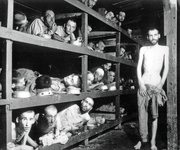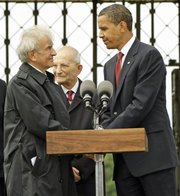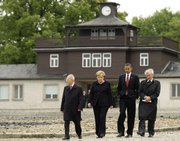Q & A with Elie Wiesel
Wednesday, September 28th, 2011
With Commentary by Carolyn Yeager
This Q & A was presented in the Post and Courier newspaper on September 18 as a question & answer session in connection with Elie Wiesel’s speech at the College of Charleston (South Carolina) on Sunday, Sept. 25.
I have added some comments and questions that I would have liked to ask Mr. Wiesel had I been allowed to be present. Of course, this was a very controlled event, if it were not, in fact, private, one week before the speech. The main interest here is how Wiesel skirts around all questions and gives the same pat answers that he has been giving for years. He has rehearsed what he will say and does not go beyond his rehearsed answers; thus his answers never change and often strike an aberrant note, as if not directly relating to the question. ~cy
The first picture accompanying this news story is the famous one that is permanently associated with Wiesel wherever he goes.
The caption tells us that Wiesel is in the picture, but we, the followers of this blog, know that he is not and that a Gigantic Fraud has been carried out concerning this picture, by powerful forces such as the New York Times, and by Wiesel himself.
Q: In your book “Night,” you describe the ardent faith you practiced as a child and address the dilemma of a compassionate God, making it clear that because of the Holocaust and what you witnessed during your ordeal, you became a skeptic. Are you still asking questions? What is the nature of your faith or nonfaith today?
A: First question, yes, I continue asking questions. I belong to the Talmud tradition. The Talmudic tradition actually emphasizes the question, much more than the answer. Answers come and go, the questions are eternal. When it comes to the question of faith, of course, … profound or painful. So what I say to myself is, “Of course I believe in God.” I believe in God because my father and my grandfather and his and so forth, they all believed, and (down) the line — I hope I’m not the last. … But my faith is a wounded faith.
Comment: Wiesel is proud to be Talmudic. In his tradition, answers are not expected. Perhaps answers are not even missed, for Talmudic Jews take pride and pleasure in endlessly discussing what is God among themselves. They determine God; it is not God who informs them. Wiesel says he continues to profess belief in God because he wants to honor his ancestors. It is a Jewish tradition.
Q: And what about the concept of justice? Is it possible to reconcile it with the abomination that was the Holocaust?
A: To me, this is the question of all questions. On many levels, I don’t understand God, which I cannot. We have a very, very great sage called Rabbi Eliezer HaKalir. He was a great, great thinker and a poet, too. And he said, “If I knew God I would be God.” So nothing concerning, really, the definitive God, the Almighty, Just, the King of the Universe is a question. I don’t know how it’s possible He knew and yet he is silent. So the silence of God troubles me. But it doesn’t stop there. The silence of the world’s leaders also troubles me.
Comment: The King of the Universe, says Wiesel, is silent about the Holocaust. Could it be because it is untrue and their God doesn’t or can’t acknowledge what is false and has no reality? In any case, Wiesel would rather focus on the world and its leadership.
Q: There’s sacred justice, but there’s also human justice.
A: Yes. Human justice. Exactly.
The next picture shows President Barack Obama shaking hands with Elie Wiesel, who specifically invited the U.S. president to visit the former Buchenwald camp during his trip to Germany in June 2009. Wiesel has great influence as the most famous survior of Buchenwald … but wait! He wasn’t at Buchenwald. There are no records of his being there and he is not in the famous photograph above. What kind of trick is being played on the unsuspecting President Obama?
Q. And what about that? Humans are so fallible, as we know, and their justice is imperfect. Do you still think that (human) justice could ever match the depth of the injustice of the Holocaust itself?
A: It comes to define justice. Justice with a capital J — absolute justice — is one question. But the justice which has, — how to say? — betrayed, perverted human beings, that’s another question.
Comment: This answer doesn’t answer anything. Instead, it repeats the question–a typical Wieselian response.
Another iconic photo chosen for this story is this one also taken at Buchenwald in 2009. It shows Obama and German Chancellor Angela Merkel walking with Wiesel (on the right), who is “showing them around.” I believe this is his very first visit there. But then, that’s no doubt true for all of them.
Q: Has life for you continued to be a long “night”? If so, what has kept you going? What, if anything, gives you joy?
A: Joy. … I see children, I have joy. I have my grandchildren, I have joy. On the other hand, I remember that we lost almost 2 million children. So the joy is not a perfect joy anymore.
Comment: Apart from the fact that 2 million children were not lost, Wiesel is a millionaire, lives in one of the highest priced locations in the world, is listened to by rulers, presidents and celebrities; has hundreds of people to do his bidding. The public treats him with reverence. His beloved State of Israel has become a great power. But I guess we’re to believe he is really suffering.
Q: Has there been any change, any little glimmer of light that managed to penetrate the “night”?
A: The answer is yes, it must be. It must. I think it was (Albert) Camus who said when there is no happiness, you must create happiness. That goes for joy, that goes for peace, that goes for all the good things in life. To say that night has vanished, no, it’s not, it’s still there. But paradoxically, other things came afterwards, and they, too, are as real. In other words, I would still say night is long and infinite, but I’m not alone in this world.
Comment: Time for the violins to start playing in the background.
Q: And in a way, perhaps, your writing itself, all the books, has helped to create some semblance of happiness for you?
A: Only if other people are happy and feel victorious over sadness. My happiness must be a result of theirs.
Comment:The violins are still playing.
Q: The Holocaust surely was an aberration, an example of Fascism run amok. But Fascism has a tendency to run amok, as you repeatedly have pointed out. You have condemned genocides and reminded the world that it must remain vigilant. How do you categorize the Holocaust? Was it unique in its nature, or only its scale?
A: No, I think it was unique; therefore, it must remain unique in memory. Once you say that it’s not, it opens history again to other mass murder. History has proven that it can and, therefore, it may continue.
Comment: Take notice! Wiesel is making it clear: the Jewish Holocaust was unique! His reasoning (?) is that if it were not, new genocides can happen. The Holocaust, by being unique, closes history to more mass murder. (This is perilously close to saying the Jews died so that others would not — an aspect of their hidden agenda to replace Christ with The Jew.) But he follows by saying it can, and may, continue. As he said at the beginning, there are no answers … not from God and not from him.
Q: You have long been a supporter of Israel, and were once invited to consider public office there.
A: (Laughing) I was offered to be a president. I was under pressure in the first few weeks, and, you know how it is, the more I said no, the harsher the pressure grew.
Comment: He has a close relationship to all top Israeli politicians, from at least 1950 on.
Q: So what made you decide to stay in the United States?
A: I came here in 1956. I came as a stateless person. Can you imagine? You cannot, because you were born here probably. … And here I came, I was accepted by the United States as an American citizen. And I had my passport all the time with me because I never had another passport in my life. So I owe this country quite a lot. I love this country.
Comment: This is an insincere answer. He could have become a citizen in any state, certainly in France even when he was underage. He didn’t want to. He wanted to be in the most powerful country, the one the Jews of Israel planned to control. This is why he came to the U.S. and devoted himself to projects like bringing into existence the United States Holocaust Memorial Museum, a huge victory for Jews.
Q: Do you ever worry about the ways in which the Holocaust has defined Jewish identity since the war?
A: Well, I know I read about it. Some people believe this is exaggerated — we shouldn’t do that. I don’t like to turn it into an object for discussion. … What every person does or thinks with regards to (an event), I don’t want to put myself in their soul-searching. I think memory is what defines a human being and society. If you betray memory, you betray yourself and all those who believe in it.
Comment: He doesn’t answer the question. In truth, the ‘Holocaust’ has defined not just Jewish, but Anglo-American and European identity in ever-increasing strength since 1945. It is non-Jews who should be very worried about how the Big H has defined our identity, which is why Wiesel avoids the subject.
Q: When it comes to Jewish identity, how important is Israel? And what do you think should be done to resolve the conflict there?
A: I’m optimistic. … My foundation has created many things. My foundation is the one that brought together the prime minister of Israel (Ehud Olmert) and (Palestinian Authority) President (Mahmoud) Abbas. (Note: The historic first meeting of Olmert and Abbas took place at the Elie Wiesel Foundation’s second annual Conference of Nobel Laureates in Petra, Jordan, on June 22, 2006.) For the first time, they met under our auspices, and they met, they fell into each other’s arms with tears in their eyes. I turned to my wife, I said, “Look.” This is the best event that I witnessed in many, many years. Which means it can be done, therefore, it will be done, my feeling is within a year or two.
Comment: How evasive is that? He brings up something that occurred in 2006 – 5 years ago! This is more avoidance of facing the real crisis that Jewish Israel has brought about by its constant theft in the name of establishing an ‘identity’ for itself.
Category Featured | Tags: Tags: Angela Merkel, Barack Obama, College of Charleston, Elie Wiesel, Holocaust, Jewish identity, Post and Courier, Talmud,
Social Networks: Facebook, Twitter, Google Bookmarks, del.icio.us, StumbleUpon, Digg, Reddit, Posterous.




